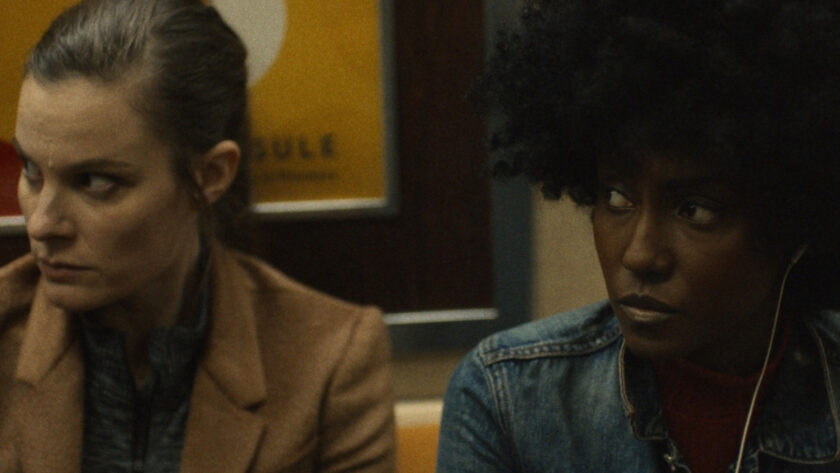Sungleen Moon reviews an anthology film about womanhood as part of our Raindance 2020 coverage.
David Gutnick’s directorial debut feature Materna offers a film that explores the title and its connotations. The narrative follows four female protagonists, all appearing to lead extremely different lives, unalike in their work, identity, politics, race, and home-life. Despite their differences, the women are connected by the fact they live in the complex, lonely, and diverse city of New York. As they all struggle with their complicated familial relationships, the women attempt to unpack the idea of the mother, exploring their relationships with their own mothers or examining their own motherhood.
The opening scenes show the four women in a New York subway, looking anxious and tense as they are disturbed by a man harassing and irritating passengers. This opening is a clever way for Gutnick to show us what the film will be about, as later on, this man becomes the reason why the women are physically bound together. The New York subway and any public transport in a large city is one of the only places where the vast and immense population, composed of a myriad of different identities, gather in confined spaces and attempt to tolerate each other. In Materna, Gutnick is attempting a feminist and psychological story about the deep connection between diverse and extremely different groups of people, particularly women, and their emotional similarities and connections.
Through its structure and composition, Materna asks you to sympathise with the four women and their stories are often made to feel metaphorical and deep. At times, the film is successful, and the stories felt powerful. At other times, it was confusing and overly ambiguous. One story, in particular, left you wondering why it was there. One of the four women, Jean (Kate Lyn Scheil), is a white, conservative mother, proud of her bigoted beliefs and attempts to condition and adopt her views on to her son. The discussion on mothers being over-maternal and over-protective felt underdeveloped and was executed strangely; the resulting script could even possibly be considered harmful to viewers. The commentary on familial political tensions also felt unintentionally comical, as the actors portraying these prejudiced characters were often unconvincing and did not solicit sympathy.
The differences in quality between the stories became more evident as the last story was shown. Assol Abdullina, one of the co-writers of the screenplay, plays Perizard, returning home to Kyrgyzstan after a tragic bereavement. Although her story wasn’t set in New York and felt largely unique to its own, further distancing the narratives between each other, I still enjoyed watching the relationships between the three generations of women portrayed and their journey of grief. Assol Abdullina’s performance was authentic and captivating, deserving of her Best Actress Award for Materna at the 2020 Tribeca Film Festival.
Gutnick delivers a story that focuses on diversity and the contrast between people, as he attempts to weave together an anthology of female stories and showcase their differences and similarities. Unfortunately, at times, the theme did not prove strong enough. The connecting thread occasionally felt too vague for the stories to feel like they were part of an over-arching plot. Although it is pleasant to see Gutnick, a white director, consider diversity and inclusion in his film, the topic of diversity is delicate and should be approached with care and consciousness. The attempt to connect women who have experienced largely different cultural and political lives felt at times unnatural. As a viewer, there was inappropriate pressure to value each story equally and to empathise with all these women synonymously. One thing that I enjoyed was the different stylistic choices and directorial differences between each character. For example, Gutnick would utilise close up shots of Jade Eshete’s character, capturing the intimacy and tension her character felt between her and her surrounding characters — this contrasted with Assol Abdullina’s character, who was balanced with the scenic surroundings and cultural backdrops of Kyrgyzstan.
Some aspects of the feature were stronger than others at making the story and the characters more compelling. However, this film did bring a contemplative perspective of the female struggle and female relationships to the table. I found the sci-fi mood of the score and the mood-based cinematography helped communicate the lonely and melancholy emotions women can feel, and their struggles to handle complex relationships with their families as well as themselves.




